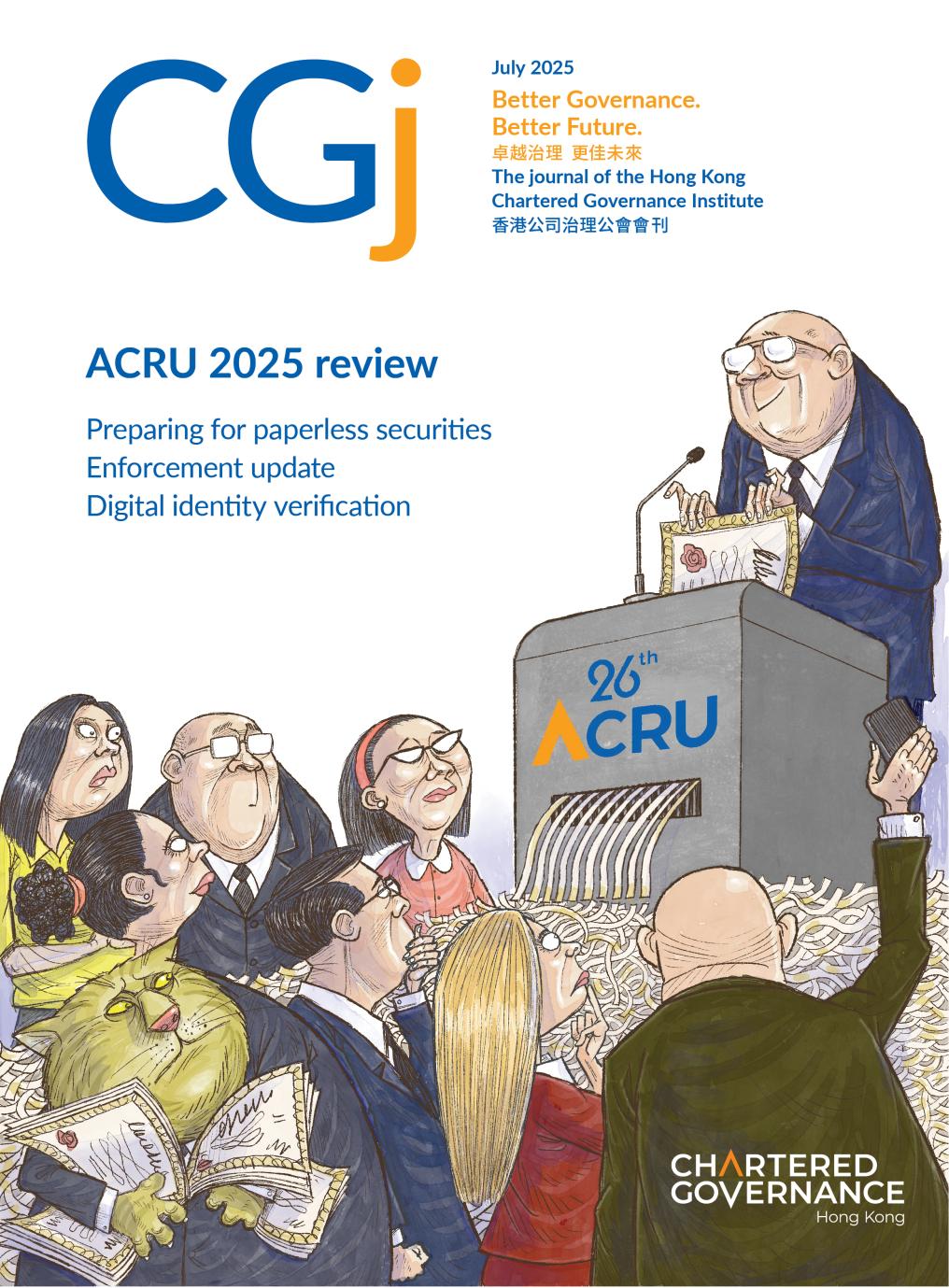
Buybacks and treasury shares · A strategic tool for companies
Polly Wong FCG HKFCG(PE), Company Secretary and Group Financial Controller, Dynamic Holdings Ltd, discusses the implications of the new treasury share regime and how it empowers listed companies with strategic flexibility while reinforcing safeguards for investors.
Highlights
- the new regime allows companies to hold repurchased shares in treasury for future resale, facilitating more agile responses to market conditions, better capital management and increased shareholder value
- measures such as resale restrictions, disclosure requirements and moratorium periods aim to mitigate the risks of market manipulation, insider trading and shareholder dilution
- the treasury share regime brings Hong Kong in line with international standards, modernising its capital management framework and boosting market competitiveness
Introduction
In April 2024, underpinned by strong market support after its consultation period from October to December 2023, The Stock Exchange of Hong Kong Limited (the Exchange) announced the introduction of a new treasury share regime, which came into effect on 11 June 2024, with relevant amendments to the Rules Governing the Listing of Securities (Listing Rules). The regime allows issuers to hold repurchased shares in treasury and to resell them under certain conditions, and aims to provide issuers with greater flexibility in managing their capital structure, mitigate the risks of market manipulation and insider dealing, and maintain a fair and orderly market.
Definition of treasury shares
Treasury shares are defined as shares repurchased and held by an issuer in treasury, as authorised by the laws of the issuer’s place of incorporation and the issuer’s constitutional documents. They include shares repurchased by an issuer and held or deposited in the Central Clearing and Settlement System for sale on the Exchange. In light of this, amendments to Hong Kong’s Companies Ordinance (Cap 622) have been made to enable issuers incorporated in Hong Kong to benefit from the treasury share regime in the same manner as non– Hong Kong issuers.
Major changes to the regime
Treat the resale of treasury shares as new shares
Issuers must conduct any resale of treasury shares under a shareholders’ mandate or offer the treasury shares to shareholders on a pro rata basis.
The shareholders’ mandate must specifically authorise the resale of treasury shares. For issuers also listed on another stock exchange, shareholder’s approval is required to resell the treasury shares on that other stock exchange.
Share schemes that use treasury shares must comply with Chapter 17 of the Listing Rules (or Chapter 23 of the GEM Listing Rules). In addition, there are restrictions on the resale of treasury shares to connected persons.
Appropriate disclosures shall be made in, for example, next day disclosure returns, announcements and annual reports after the resale of treasury shares.
Requirements to mitigate the risk of market manipulation and insider dealing
The new regime includes risk mitigation measures to prevent market manipulation and insider trading, as set out below:
- a 30-day moratorium period to restrict the resale of treasury shares after a share repurchase and vice versa, subject to certain carve-out provisions
- a prohibition against the resale of treasury shares on the Exchange, such as:
- when there is undisclosed inside information, or
- during the restricted period of 30 days preceding the results announcement, and
- a prohibition against the resale of treasury shares if it is knowingly made with a core connected person. However, the on-market resale of treasury shares to a connected person without knowledge will be fully exempt from the connected transaction rules.
Requirements relating to new listing applicants
Under the revised Listing Rules, new applicants may retain their treasury shares after listing, although details should be disclosed in its prospectus.
The restriction in Listing Rule 10.08 will be extended, so that a new listing applicant shall not issue any new shares or resell any treasury shares, or enter into any agreement for such new issue or resale, within six months after listing.
If a new listing applicant obtains a shareholders’ mandate for the repurchase of shares after listing, it must disclose in its prospectus whether it intends to cancel the repurchased shares or hold them as treasury shares. If a new listing applicant intends to repurchase a material part of its shares shortly after listing, this must be adequately explained and disclosed in the applicant’s prospectus and in its cashflow forecasts submitted to the Exchange.
Consequential amendments to address the treatment of treasury shares
Voting rights. Under the revised Listing Rules, issuers (being holders of treasury shares) will be required to abstain from voting on matters that require shareholders’ approval under the Listing Rules.
Calculation of issued shares. Treasury shares will be disregarded when calculating an issuer’s issued shares or voting shares for the purposes of determining:
- the public float or market capitalisation of the issuer
- calculations for size tests
- limits for the issue or purchase of securities as a percentage of the issued shares, for example general, repurchase or scheme mandate limits, and
- a person’s percentage of voting rights, for example the definition of controlling and substantial shareholder, or interest in the issue, for example when assessing the independence of nonexecutive directors.
Disclosure of intention to hold treasury shares. The issuer will need to disclose (in the explanatory statement for the share repurchase mandate) whether it intends to cancel any repurchased shares or hold them as treasury shares. The Exchange acknowledges that an issuer’s intention regarding the treatment of repurchased shares may change due to evolving circumstances.
To ensure transparency, amongst other matters, when reporting any share repurchases in a next day disclosure return, the issuer is required to identify the number of repurchased shares that are to be held in treasury or to be cancelled and, if applicable, disclose the reasons for any deviation from the intention previously disclosed by the issuer in the explanatory statement.
Strategic implications of the new regime
The implementation of treasury shares in Hong Kong has had several notable impacts on companies, investors and the broader financial market that we should be aware of. Here’s a breakdown of the key benefits.
Enhanced flexibility for companies
Share buybacks and reissuance. Since the Companies Ordinance was amended in 2014, Hong Kong–listed companies have been allowed to hold treasury shares after buybacks. This means they can reissue these shares later, for example for employee incentive schemes, M&As or raising capital, without the requirement of shareholder approval each time.
Better capital management. Companies can optimise their capital structure by buying back undervalued shares and reissuing them when prices recover.
Other options. Instead of cash, companies can use treasury shares to finance mergers, preserving liquidity while offering equity incentives.
Increased shareholder value
Improved earnings per share and return on equity. Reducing outstanding shares via buybacks can boost earnings per share (EPS) and return on equity (ROE), making stocks more attractive.
Price support mechanism. Treasury share buybacks can help stabilise stock prices during market downturns by signalling confidence.
Corporate governance and market confidence
Reduced dilution risk. Companies can use treasury shares for acquisitions or employee compensation without diluting existing shareholders.
Potential for misuse. Critics argue that treasury shares could be used for market manipulation, for example artificially inflating stock prices before major sell-offs.
Impact on liquidity and market dynamics
Short-term liquidity boost. Buybacks can increase trading activity.
Potential reduced float. If companies hold treasury shares long term, the free float may shrink, possibly increasing volatility.
Regulatory and tax considerations
Listing Rules. The Exchange requires disclosures on treasury share transactions to ensure transparency.
No tax benefits. Hong Kong does not provide tax advantages for buybacks, unlike other jurisdictions such as the US.
Prevents hostile takeovers
By reducing the number of shares available on the open market, a company can make it harder for an outside party to accumulate a controlling stake.
Optimises capital structure
If a company has excess cash but limited growth opportunities, buying back shares is an efficient way to return capital to shareholders. It is a tool to maintain an optimal debt-to-equity ratio by reducing equity.
Risks and limitations of treasury shares
On the other hand, there are potential downsides to consider for treasury shares.
Cash drain. Buybacks use up cash that could be invested in growth.
Market manipulation risks. If used irresponsibly, buybacks can artificially inflate stock prices.
No guaranteed benefit. If the stock is overvalued when repurchased, it destroys shareholder value.
Inflate risks. Companies might also artificially inflate EPS by reducing outstanding shares, masking underlying weaknesses.
Conclusion
While the vast majority of issuers listed on the Exchange are incorporated in jurisdictions that allow the holding of treasury shares, such as the Chinese mainland, Bermuda and the Cayman Islands, these issuers have had to cancel repurchased shares under the old regime. The new framework governing the resale of treasury shares will align Hong Kong with international market practice, thereby supporting the growth and vitality of the Hong Kong market. Moreover, the introduction of treasury shares in Hong Kong has generally been positive, offering companies greater flexibility in capital management while supporting shareholder value. However, regulatory oversight remains crucial to prevent misuse.
In addition, treasury shares offer strong financial benefits, including EPS growth, improved ROE, stabilised stock prices, sound capital management and flexible capital deployment. Treasury shares don’t vote, don’t earn dividends and remain invisible in earnings calculations, yet their strategic deployment can alter a company’s trajectory. Whether as a defensive mechanism, a reward system or a financial lever, treasury shares epitomise the quiet power of corporate finance, unassuming but transformative when wielded with precision. Nevertheless, they must be used strategically to avoid a double-edged sword that could potentially destroy underlying value.
“Treasury shares don’t vote, don’t earn dividends and remain invisible in earnings calculations, yet their strategic deployment can alter a company’s trajectory.”
Polly Wong FCG HKFCG(PE), Company Secretary and Group Financial Controller
Dynamic Holdings Ltd


